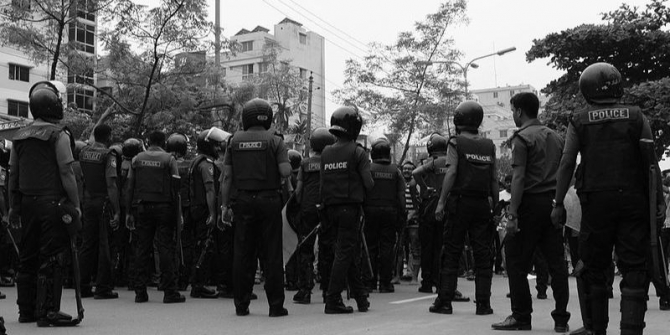Bangladesh is an important player among South Asian states for China’s political-military realism. Such strategic partnership with Dhaka provides Beijing with added leverage to check Indian forces, writes Mohammad Tarikul Islam (Jahangirnagar University, Bangladesh).
Diplomatic relations between Bangladesh and China were established in 1976, five years after Bangladesh’s independence. Consolidation and enhancement of China-Bangladesh friendship and cooperation serve the fundamental interests of both countries, meet common aspirations of their people and are conducive to peace and development in the region and the world. This is why both decided to establish a “Closer Comprehensive Partnership of Cooperation” from the strategic perspective, on the basis of principles of friendship, equality and mutual benefit.
Both nations exchange high-level visits and contacts and are intensifying exchanges between government agencies, parliaments, political parties, armed forces, and non-governmental groups. They promote communication and cooperation at the local government level and enhance bilateral cooperation mechanisms, including diplomatic consultations, joint economic and trade committees and joint agriculture committees.
To bridge the massive trade gap between them, China has not only provided economic aid to Bangladesh but also signed the Asia Pacific Trade Agreement (APTA) to remove tariff barriers from commodities imported from Bangladesh. Bilateral trade amounted to US $ 7 billion in 2010. China has offered to develop natural gas resources and nuclear power plants in Bangladesh, to meet its growing energy requirements. The landlocked Yunnan province of China has sought economic cooperation with Bangladesh to help gain access to the Bay of Bengal. Bangladesh too, has offered to set up a Special Economic Zone for China.
The Agreement on Economic and Technical Cooperation and a framework agreement on a concessional loan provided by China to Bangladesh are two significant treaties signed between the two nations.
Connectivity is essential to enhance mutual cooperation. In this regard, China and Bangladesh have been negotiating and have decided to build a 900 km highway project to connect Chittagong and Kunming through Myanmar. This highway would give Bangladesh entry into the Mekong sub-region, which already includes China, accelerate trade and facilitate people-to-people contact.
This would not only overcome the long sea passage, from the east coast of China through Singapore (for trans-shipment) to Bangladesh, but would also lower transport costs and add to the economy of Yunnan province. This also fits well with their joint initiative of improving Chittagong port infrastructure for dual use, for merchant vessels and also for the navies of both countries.
Bangladesh’s ‘Look East’ policy is essentially designed to lessen its dependence on India and open up new avenues of cooperation with China and South-East Asia. However, in the process of ensuring this, Bangladesh’s dependence on China has gradually increased, thereby giving Beijing greater leverage in bilateral ties.
Under the framework of the Asia-Pacific Trade Agreement (APTA), China removed tariff barriers on 84 types of commodities imported from Bangladesh, including jute and textiles (chief exports of Bangladesh).
Bangladesh–China–India–Myanmar Forum for regional cooperation (BCIM) is a sub-regional entity of Asian nations aiming for greater integration of trade and investment between them. From the early 1980s, the Bangladesh Army has been equipped with Chinese tanks, its navy has Chinese frigates and missile boats and the Bangladesh Air Force flies Chinese fighter jets. In 2002, China and Bangladesh signed a “Defence Cooperation Agreement”.
The geographic area encompassing South Asia and its contiguous maritime spaces are of growing strategic importance to China, reflected in its web of partnerships and coalitions with regional states. The dynamics of these relationships appear on the surface to be based on interdependence, but are actually driven by long-term political, economic and strategic interests.
Bangladesh is an important player among South Asian states for China’s political-military realism. Such strategic partnership with Dhaka provides Beijing with added leverage to check Indian forces. This is evident from the regular political exchanges and enhanced military cooperation between the two countries.
The Bangladesh Prime Minister has adopted a diplomatic outlook in line with the guiding principle of the country’s Constitution, “Friendship towards all, malice toward none.” However, in trying to ensure this, Bangladesh’s dependence on China has increased. Both nations have pledged to cooperate more closely, ensuring long term friendship, equality and mutual benefit to sustain their “time tested all- weather friendship”.
Sino-Bangladesh relations are not only a matter of closer, comprehensive cooperation, but a dynamic process which has metamorphosed from economic partnership into the realm of strategic partnership.
Clearly Prime Minister Sheikh Hasina is now trying to capitalise on the geopolitical advantage that Bangladesh enjoys as a country which overlooks the strategically important sea lanes of the Indian Ocean linking China with the Persian Gulf, which have a role in securing energy supplies for Beijing. Such an approach speaks of her vision to move ahead with an essentially ‘win-win’ situation, by leaving behind China’s hostile attitude during Bangladesh’s liberation war in 1971.
This article gives the views of the author and not the position of South Asia @ LSE blog, nor of the London School of Economics. Please read our comments policy before posting. Featured photo: Cooperation | Credit: Pixabay, PublicDomainPictures.
This article first appeared on South Asia Monitor.
Dr. Mohammad Tarikul Islam is an Assistant Professor of Government and Politics at Jahangirnagar University in Bangladesh and Visiting Research Fellow (Trinity Term-2018), Oxford. Dr. Islam previously served Local Government and Disaster Management Cluster of United Nations Development Programme for a period of seven years in different capacities.







